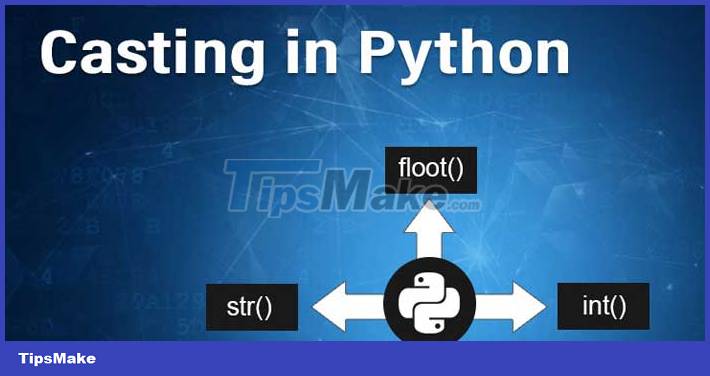Casting in Python
Casting in Python has quite a few practical applications. Here's what you need to know about casting in Python .

Define variable type
Sometimes you may want to specify a type for a variable. This can be done by casting or casting in Python.
Python is an object-oriented language, so it uses classes to define data types, including its 'primitive' types.
Casting in Python is done using constructors:
Int()- Constructs an integer from an integer, a float character (by removing all decimals) or a string literal (providing the string representation of an integer).Float()- Construct a float from an integer, a float, or a string literal (provide the string representation of a float or an integer)Str()- Build a string from a range of data types, including string, integer string, and float character string.
For example:
Integer:
x = int(1) # x sẽ là 1 y = int(2.8) # y sẽ là 2 z = int("3") # z sẽ là 3Float:
x = str("s1") # x sẽ là 's1' y = str(2) # y sẽ là '2' z = str(3.0) # z sẽ là '3.0'Table of data type casting functions in Python
| STT | Function and description |
|---|---|
| first | int(x [,base]) casts to int |
| 2 | long(x [,base] ) casts to long int. |
| 3 | float(x) casts float. |
| 4 | complex(real [,imag]) casts complex number. |
| 5 | str(x) casts string. |
| 6 | repr(x) casts to the expression string. |
| 7 | eval(str) casts string to object. |
| 8 | tuple(s) casts tuple type. |
| 9 | list(s) casts the type list. |
| ten | set(s) casts the set type. |
| 11 | dict(d) casts dictionary. |
| twelfth | frozenset(s) casts the frozen set type. |
| 13 | chr(x) casts print to char |
| 14 | unichr(x) casts an int to a Unicode character. |
| 15 | ord(x) casts the character to int. |
| 16 | hex(x) converts integer to hexadecimal string. |
| 17 | oct(x) casts an integer to an octal string. |
Above is the basic information you need to know about casting in Python . Hope the article is useful to you.
4 ★ | 1 Vote
 How to Check Python Version on Windows, Mac and Linux
How to Check Python Version on Windows, Mac and Linux How to Start Programming in Python
How to Start Programming in Python How to Uninstall Python
How to Uninstall Python The Python Interpreter is now available on the Microsoft Store
The Python Interpreter is now available on the Microsoft Store How to install Python plugin to be able to execute Python programming on IntelliJ
How to install Python plugin to be able to execute Python programming on IntelliJ The latest changes in Python 3.9
The latest changes in Python 3.9